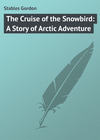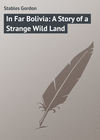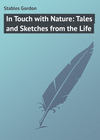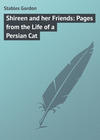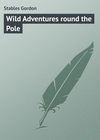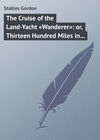Kitabı oku: «The Cruise of the Snowbird: A Story of Arctic Adventure», sayfa 10
“What about Plunket’s prisoner?” asked Rory.
“Plunket’s prisoner,” said Seth, “came in very handy. It was spring, you see, and there were potatoes to plant and maize and onions to sow, and what not I tied the creature to Plunket for safety. He had plenty of rope, and when he saw I didn’t mean to kill him he started and worked away like a New Hollander. When everything was in the ground – and that took us three weeks – I started him off with a message to Quimo, his chief, and I can tell you, gentlemen, no Yack Injun has ever drawn knife on old Seth since.”
“But,” said Rory, “weren’t you going to tell us about the Norwegian walrus-hunters?”
“Oh!” said Seth, “it was like this. I heard of the shipwreck, and I went right away over with Plunket to see if I could be of any service. And it was well for those hunters I did. I found fires alight to torture them, and irons heating to make them skip and jump. The blueskin chief was in high glee; he was expecting rare fun, he told me, ‘Well, Quimo,’ says I to him, ‘you always was about the peskiest old idgit ever I came across.’ ‘How now,’ says he, ‘great and mighty hunter?’ ‘You’re an almighty squaw,’ says I; ‘why don’t you wear a “neenak” and carry an “awwee”? Come now, Quimo, let me be master of ceremonies, I’ll show you better fun than you could make.’ ‘My white brother,’ said Quimo, ‘is very wise.’ ‘And you’re an old fool,’ says I. This wasn’t flattery, gentlemen, I own, but old Seth knows the Indian character well.”
(Neenak: the short apron of sealskin the women of some tribes of Yack Indians wear.)
(Awwee: baby or young one, applied to animals as well as human beings.)
“I goes straight to where the Norwegians were lying bound, and cuts their cords. ‘Now,’ says I to them, ‘you’ve got to dance and sing and do all you can to please these Injuns; and, mind, you’re doing it for dear life!’ Gentlemen, I laugh to myself sometimes even yet when I think of the capers them four poor chaps cut. Old Quimo roared again, and laughed till the tears rolled down his dirty cheeks; then he vowed by the sun (the god of the Yack), that the hatchet should be buried for ever between him and the white man.
“But these Norwegians stopped and settled down among the tribe, and they have taught them caribou sleighing and hunting the walrus with iron-shod spears, instead of the old caribou-horn toasting-forks they used to use. But come, gentlemen, old Seth would keep you talking here all day. Let us get up and be doing, for I reckon you came ashore for a bit of a shoot.”
“That we did!” said McBain, “and if you’ll be our guide, you shall have as much tobacco as will last you for a year.”
The tears seemed to stand in Seth’s eyes with delight at the prospect. “I guess,” he said, “this old trapper knows where the best caribou are to be had, and so does Plunket too.”
With Seth, to make up his mind was to act, and in five minutes he had rehabilitated himself in his skins, slung on his shot-belt, and shouldered his rifle. Rory was now bemoaning his fate in not having brought his rifle instead of a fowling-piece, but Seth soon got him over that difficulty. He strode into the wigwam, and presently reappeared with a very presentable weapon indeed, and soon after, in true Indian file, they were threading their way through the forest, the mastiff first and Oscar second, seeming determined to follow the lead and do whatever the other dog did. The road – or rather, I should say, their way, for path there was none – led upwards and inland, and after a walk of fully an hour they came out into a broad open plain. This they crossed, and then wound round some hills – high enough to have been called mountains in England – when suddenly, on rounding a spur of one of these, a scene was opened out before them that my pen is powerless to describe. They stood at the mouth of a beautiful glen, or ravine, the whole bottom of which was a sheet of water that reflected the sky’s blue and the cloudlets that floated like foam flakes above, while the lofty and rugged cliffs that surrounded the lake were green-fringed with trees, the silvery birch and the white-flowered mountain ash showing charmingly out against the more sombre hues of pine and firs; and above all were the everlasting hills, their jagged peaks white-tipped with snow, on which the sun shone with silver radiance. Patches of colour here and there relieved the green of the trees, for yonder was a bold bluff, covered with scarlet lichens, and closer to the water were patches of crimson and white foxglove. Cascades, too, formed by the melting snows, could be descried here and there, and the noise they made as they joined the lake fell upon the ear like the hum that arises from a distant city.
They stood entranced, and Rory was thinking he would rather be armed with sketch-book than rifle, when —
“Hist!” cried Seth.
They followed his eye. On a rock right above them stood boldly out against the sky a tall stag; you might have counted every branch in his antlers.
“Don’t fire!” cried Seth.
It was too late. Bang went Rory’s rifle, and the echoes reverberated from rock to rock, fainter and more faint, till they were lost in the distance. Down rolled the stag.
“I guess that has spoiled our day’s sport,” said Seth, quietly. “Listen.”
What is it they hear? The whole earth seems to tremble, and there is a sound comes from the woods like that of far-off thunder?
“They’re off,” said Seth; “that was a general stampede. In half-an-hour more we’d have had some fine skirmishing. They had been down to drink and were resting afterwards.”
Rory had to pay for his experience anyhow in a three hours’ manoeuvring march. They did outflank the deer at last, but they were somewhat wild, and the sport was only fair.
It was nightfall ere they reached Seth’s wigwam once more, and they were thoroughly tired, and glad to rest while Seth cooked the supper in a way that only Seth could.
That night they spent in the wigwam; next day they went on board, and Seth went with them, their object being to organise a little expedition against the caribou. McBain meant to make a week’s stay here to replenish his larder fore and aft, ere they tripped anchor and made sail for wilder regions to the westward and north.
You may be sure Rory did not forget his sketch-book, nor a light canoe he had which one man could carry on his back.
They had a week of such glorious sport, both in fishing and shooting, that when the last evening came round both Ralph and Rory averred that they would like to stay among these wooded hills for ever.
“I guess,” said Seth, “you’d get tired of it.”
“Do you ever tire of it?” asked McBain, and he asked the question with a purpose.
“There are times,” said Seth, looking into the log fire around which they sat, and giving a kind of sigh, “when I think that a little change would do myself and Plunket a power of good.”
“You shall have it,” cried McBain, jumping up and catching the old man by the hand, “you and Plunket too. Come with us in the Snowbird, we’ll make you as comfortable and happy as the day is long.”
“If I thought I’d be of any use – ” began Seth.
“Of use, man,” cried McBain; “you’re the handiest fellow ever I met in my life.”
“And that you’d bring me home again.”
“If we don’t we’ll never return more ourselves,” said McBain.
“Then, gentlemen,” said the trapper, “I’ll accept your offer. There!”
Chapter Fifteen
The Old Trapper Buries his Valuables – The “Snowbird” Goes on her Voyage – Ice – A Whale in Sight – A Fall! A Fall! – In at the Death – The “Trefoil” on Fire
Old Seth the trapper had a deal to do before he could accompany our heroes on board the Snowbird. “For ye see, gentlemen,” he explained to them, “as soon’s they find out that the Old Bear, as they somewhat irreverently nominate this child, has left his wigwam, I guess the Yacks’ll pretty quickly come skooting around here, to pick up whatever they’re likely to lay their dirty hands on, so I reckon I’ll just bury my valuables.”
A very practical individual was Seth, and when once he made up his mind to do a thing he just did it straight away; so, as soon as they had eaten their last breakfast at his wigwam, assisted by one or two of the yachtsmen, the burial of the valuables commenced. A large hole was dug not far from the door of the hut, and this was carefully lined with hay, and on the hay were piled Seth’s household goods, in the shape of pots and pans, and plates and dishes, and every variety of cooking and kitchen utensil, with the greater portion of the old man’s armoury plus his wardrobe. Not the best portion of the latter, however; no, only some of his skin suits, for shortly before these were deposited in their temporary grave, Seth had retired for a space to the privacy of his garret.
“I reckon,” he said to himself, with a smile, as he began to undress, “that old Seth’ll kinder astonish the weak nerves of these English sailors.” Don’t suppose they’d guess the old trapper was in possession of anything decent to put on. He reckoned upon astonishing our travellers, and he certainly was not far out of his reckoning, for when he again appeared in their midst, arrayed in a long blue coat with brass buttons, shoes with silver buckles, silk stockings, and knee-breeches, white collar up to his eyes, and crowned with a beaver hat of immense longitude, and with a face as serious and long as your own, reader, when you look into the bowl of a silver spoon, Rory, whose risibility was never under the most perfect control, simply rolled on the grass and screamed. Allan was the next to go off, and then Ralph exploded, and finally McBain. Even Oscar joined the chorus in a round of bow-bows, and the only two of the whole party that contained themselves were Seth and his mastiff.
“Guess,” said Seth, quietly recommencing the burial of his valuables, “you’re kinder ’stonished to find Seth can be civilised when he likes.”
Well, as soon as more hay had been placed in the grave, and the earth packed down over all.
“P’r’aps,” said Seth, “you gentlemen think the funeral’s over now.”
“It’s finished now, isn’t it?” asked McBain.
“Nary a bit of it,” said the old man; “I know the Yacks too well to leave the grave like that. They’d spot it at once, and have ’em up before you’d say bullet.”
The trapper’s wisdom was well shown in his next move. This was to heap a quantity of brushwood and logs on the top of all, and set fire to them.
He watched the progress of the fire until it was well alight, and the biggest logs began to crackle.
That same forenoon the first and second mates of the Snowbird were leaning over the bulwarks, looking at the shore, when the sound of oars fell upon their ears, and next minute the yacht’s cutter hove in sight round the point.
“Why,” said Stevenson, “who on earth have they got on board?”
“Old John Brown, I should think,” said the second mate.
“Well,” continued Stevenson, “I do wonder how many queer old customers the captain will pick up before the end of the cruise. Ap ain’t a chicken, and Magnus isn’t a youth, but this new old one beats all. Shouldn’t wonder if it ain’t Methuselah himself. Anyhow, Mitchell, if we do happen to want to rig a jury mast one of these days, this venerable old bit o’ timber in the long hat will be just the thing.”
When the anchor was up once more, sail set, and the Snowbird again holding on her voyage, bowling along under a ten-knot breeze, Stevenson approached to where Seth stood against the capstan.
“I say,” says Stevenson.
“Sir to you,” says Seth.
“You’re a friend o’ the captain’s, ain’t you?”
“That’s so,” from Seth.
“Well, that makes you a friend of mine,” from Stevenson. “Shake hands.”
Seth did shake hands, and Stevenson winced as he pulled his hand away.
“What an iron-fisted old sinner you are!”
“I reckon,” said Seth, quietly, “I can hold pretty tight for an old ’un.”
“Now,” continued Stevenson, “let me give you a piece of advice.”
“Spit it out,” said Seth.
“Well then, it is this: get rid of these antediluvian togs o’ yours. I won’t say you look a guy, but the suit ain’t shipshape, I assure you, and it makes you look – well, just a little remarkable; and mind you, if it comes on to blow only just a little bit, that venerable tile o’ yours’ll go overboard – sharp, and your wig too, if you wear one.”
“Look here, young man,” said Seth, “you talk pretty straight, you do; but as far as the wig is concerned, I wear my own hair as yet; as regards the togs, as you call ’em, I hain’t got nothing else to put on but skins. Skins wouldn’t suit a civilised ship. So unless you can fix me up decent and different, don’t talk, that’s all.”
“That’s fair, that’s right, Methus – I mean, Mr Seth.”
“Bother your misters,” said the old trapper; “I’m Seth, simply Seth.”
“Well, Seth,” said Stevenson, “see here, I can fix you in a brace of shakes; you ain’t much more’n a yard taller than me. Come below, Methus – ahem! Seth. Mind your hat. It would be a pity to crush that, you know.”
When Seth appeared on deck again, rigged out in a suit of Stevenson’s, albeit his legs stuck rather far through their covering, and his long bony wrists were nicely displayed, it must be confessed that he did look a little less remarkable.
Where was Seth to sleep at night? Was he to be a cabin passenger? Nay, Seth himself decided the matter by simply taking the big mastiff in his arms, and lying down on a skin in front of the galley-fire.
As for the dog himself, he began to improve in condition from the very day he came on board, and before he was a week at sea he was positively getting fat. But the Yankee trapper remained as lanky as ever. Do not think, however, that honest Seth was of no service on board; old as he was, he proved a very useful fellow. He assisted the cook, the cooper, and the sailmaker all in turns; and when he was not assisting them he was squatting on deck, making and mending fishing-tackle, and busking fishhooks with feathers, to make them represent flies.
The Snowbird had now got so far into the northern and western bays that, summer although it was, the weather was far from warm, but it continued fine. Immense snow-clad pieces of ice were to be seen daily, sometimes even hourly, and the yacht often sailed so closely to them that the very blood and marrow of the onlookers felt as if suddenly frozen into ice itself.
One morning a berg was reached larger than any they had yet seen, and the vessel had to alter her course considerably in order to avoid it. To all appearance it was an island in the midst of the dark sea, and quite an hour elapsed ere it was rounded, and the ship could again be kept away on the right tack. Hardly had she been put so, when, —
“A sail!” was the shout from the crow’s-nest – “a sail on the weather bow.”
Captain McBain went aloft himself to have a look at her, the yacht in the meantime being kept close to the wind. When he came down Rory and Allan went eagerly to meet him.
“What is she?” said the former. “Our old friend the pirate?”
“Nay,” said McBain, “not this time; it’s a whaler, right enough; all her boats are hanging handy, and she is evidently on the outlook for blubber. Peter!” he cried, speaking down the main hatch, “have lunch ready in a couple of hours. I think,” he continued, addressing our heroes, “we’ll board her. Would any of you like to go?”
Of course they would, every one of the three of them.
While they were discussing luncheon Stevenson came below.
“We’re nearly close abreast of her,” he said, “and I’ve been signalling. She’s an English barque – the Trefoil, from Hull.”
“Been whaling, I suppose?” said McBain.
“Yes, sir,” said Stevenson; “she’s been wintered, and is now engaged at the summer fishing. She’s dodging now; and I’ve had the foreyard hauled aback.”
“Thank you, Mr Stevenson. Call away the gig if the men have dined. Let them dress in their smartest. We’ll be up in a few minutes.”
It was a lovely day; a gentle swell was on, broken into myriads of rippling wavelets by a southern wind, and on it the tall-masted barque rocked gently to and fro. The gig was soon lowered and manned, and, with Rory as coxswain, they left the Snowbird’s side. How pretty she looked! This thought must have been in every one’s mind as they gazed on her beautiful lines, and thence at the large but cumbersome vessel they were rapidly approaching. Hard weather and hard usage she must have experienced since leaving England. The paint was planed and ploughed off her bows and sides in all directions, and the woodwork itself deeply furrowed and indented.
“It is evident enough she has been in the nips,” said McBain, “pretty often, too.”
A Jacob’s-ladder was thrown overboard as they approached, and a rope, when up they sprang, and next moment stood on the deck of the Greenlandman, lifting their hats with true sailor courtesy as soon as they touched her timbers.
Rough and unkempt both the seamen and officers looked beside our smart, gaily-dressed yachtsmen, but they accorded them a kindly welcome nevertheless. They were invited down below, and found themselves in a little octagon-shaped saloon, with a stove on one side, and doors opening off every other. So small was this crib, as one might call it, that, with the captain and the mate, our friends quite filled it.
The captain was a tall, stout, blustering fellow of about forty years of age, who welcomed them in, roughly but not unkindly, and showered upon them about a dozen questions without waiting for an answer to either. What was the latest from England? Were we at war? Was Hool (Hull) still in the same place? Had they brought newspapers? What would they drink? Ending up with —
“Steward, bring the bottles – confound you! what are you standing grinning there at, like a vixen fox? Sharp’s the word, quick’s the motion.”
There were many words in this sailor’s vocabulary that I do not think it right to repeat, as they were not fit for ears polite.
“What!” he cried, when McBain assured him they neither of them cared to drink – “what, a teetotal ship! Why, how the humpty-dumpty do you manage to keep the cold out, then?”
“Coffee,” was the laconic reply.
“Well, well, well!” said the Greenland captain, filling himself up half a tumblerful of rum, and drinking it off at one gulp. “But sit down all the same, and give us all the news.”
That they would, and that they did, and they answered all his questions with extreme politeness, and were just on the eve of asking him some in return anent his own adventures, when that cry, so musical and exciting to the ear of the Greenland whaler, was shouted from the mast-head, and taken up by those below, and resounded all over the ship from stem to stern, and back again – “A fall! a fall! a fall!”
The captain sprang to his feet, almost capsizing the bottles in his excitement.
“Hurrah, men! hurrah!” he roared, as he sprang up the companion, “luck’s going to turn after all. Hurrah, men! a fall! – yes, a fall in good earnest! Away, boats! Tumble in, lads! tumble in!”
Our friends were left in the Trefoil’s saloon, all staring in blank astonishment save McBain. “Listen!” said the latter.
They did, and could hear every now and then three blows struck on the deck, as if by a sledge-hammer, followed immediately by a sentence bellowed from stentorian lungs, but of which they could only distinguish the first word and the last. These were “Away!” and “Ahoy!”
“Whatever is up?” cried Rory at last; “is the ship going down, or has everybody taken sudden leave of his senses?”
“There’s a whale in sight; that’s it!” McBain replied.
“But what is the knocking?” continued Rory.
“Oh, that is to awaken the sleepers,” explained McBain; “they have no boatswain’s pipe in these ships, so they knock with their booted feet. But come, let us go on deck and see the fun.”
The captain met them at the top of the companion.
“We’re off, you see!” he cried, hurriedly. “Come on board and dine with me. I’m going to spear that fish myself; I haven’t a harpooner worth a dump. Keep in the rear of my boat if you’re going to follow, and you’ll see the fun and be in at the death?”
In at the death! Strangely prophetic were the captain’s words; our heroes remembered them afterwards for many a long day.
“A fall! a fall! Yonder she rips! yonder she spouts! A fall! a fall!”
The men were tumbling up the hatches – pouring up. You could hardly have believed so many men had been below. They ran along the decks and trundled into the hanging boats like so many monkeys; the tackles are let go, blocks creak, and one by one they disappear beneath the bulwarks and reach the water, with a flop and a plash that tell of speed and excitement. And now they are off. The men bend well to their oars, and, encouraged by the shouts of the coxswain and harpooner, they fly over the water – together first, but soon in a line, for it is a race, and the first harpooner that strikes the fish will be well rewarded.
But where is the whale? Why, yonder; two goodly miles to leeward. You can only see three parts of it – black dots above the water; the skull, the back, and the tail tip.
McBain and his boys were left almost alone, for here were hardly men enough to work the ship, and the silence that had succeeded the noise and shouting was intense in its gloominess.
“Come, lads!” cried McBain, “we mustn’t stop here; let us see the fun; let us follow the hunt, and be in at the death!”
The Snowbird’s gig was speedily alongside, and in a few minutes more was bounding over the rippling waters to where the other boats were. It needed not McBain’s “Give way, my lads! give way with a will!” to make the men do their utmost. They too were wild with excitement.
But see, the boats are spreading out; they are no longer together; the whale has dived, and there is no saying where she may come up. Ten, fifteen, twenty minutes of suspense creep slowly away; the crew of the gig have been lying on their oars. But look! there she is again! her huge bulk appears in the very midst of the boats. Let her go either way, or any way, she is sure of a shot. She makes a dash for it. Bang, bang, bang! from the bows of three of the boats. She is struck – twice struck – but she but increases her speed, the line goes spinning over the bows; there is blood in her wake, and the men bend now to their oars with the fury of maniacs. She is badly hurt; she is confused; she stops for a moment to lash the water madly with her tail, then dives once more. But she cannot sulk long, breathe she must. And the boats still go tearing on, and the lines are being coiled in again. The other boats move on ahead, too; they want to surround “the fish.” One of these is the captain’s boat; they can see his burly form in the bow. Mindful of his words, the gig keeps on in her wake.
“Back astern, men!” cries McBain, as the giant whale rises almost under their very bows. “Back, back for your lives!”
To say that our heroes were astonished at the size and strength of the angry monster, would but poorly express the amount of their surprise. Their hearts seemed to stand still with awe. They were thunderstruck. Ah! and here was thunder too, those awful blows! The sound may be heard miles and miles away on a still day. I know, reader, of nothing in nature that gives one a greater idea of vastness, of strength and power, than a whale’s body raised high in air and curved round in the attitude of striking; the skin seems tightened over, it glitters like a gigantic piston-rod, and it seems trebly powerful. But oh! to be under that dreadful tail.
When, awestruck and half-drowned with spray, our heroes managed to look around them, the thunder had ceased, the whale was gone; there were blood and foam in front of them, beyond that the wreck of the captain’s boat. She was so smashed up that she hadn’t even sunk; her timbers lay all about, and clinging to them the drowning and maimed wretches that had not been killed outright. The gig and two other boats made haste to assist. In at the death! They were indeed in at the death. The captain was among the slain. His body was found floating, strange to say, at some considerable distance from the wreck. He seemed in a deep quiet sleep. Alas! it was a sleep from which he would awake no more in this world.
And the whale had gone. She had made direct for the island of ice and dived beneath it, and there the lines were cut.
But hark! adown the wind comes the sound of a signal-gun; a minute goes by, then there is another. All eyes are turned towards the Trefoil, and now smoke can be distinctly seen rolling slowly up from her decks, near the bows.
Once again the signal-gun.
The Trefoil is on fire!
